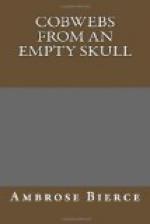The stupid elephant, not being able to make very much sense of this remark, essayed, after the manner of persons worsted at repartee, to set his foot upon his clever conqueror. In point of fact, he did set his foot upon him, and there wasn’t any more mouse.
The lesson imparted by this fable is open, palpable: mice and elephants look at things each after the manner of his kind; and when an elephant decides to occupy the standpoint of a mouse, it is unhealthy for the latter.
VI.
A wolf was slaking his thirst at a stream, when a lamb left the side of his shepherd, came down the creek to the wolf, passed round him with considerable ostentation, and began drinking below.
“I beg you to observe,” said the lamb, “that water does not commonly run uphill; and my sipping here cannot possibly defile the current where you are, even supposing my nose were no cleaner than yours, which it is. So you have not the flimsiest pretext for slaying me.”
“I am not aware, sir,” replied the wolf, “that I require a pretext for loving chops; it never occurred to me that one was necessary.”
And he dined upon that lambkin with much apparent satisfaction.
This fable ought to convince any one that of two stories very similar one needs not necessarily be a plagiarism.
VII.
[Illustration]
An old gentleman sat down, one day, upon an acorn, and finding it a very comfortable seat, went soundly to sleep. The warmth of his body caused the acorn to germinate, and it grew so rapidly, that when the sleeper awoke he found himself sitting in the fork of an oak, sixty feet from the ground.
“Ah!” said he, “I am fond of having an extended view of any landscape which happens to please my fancy; but this one does not seem to possess that merit. I think I will go home.”
It is easier to say go home than to go.
“Well, well!” he resumed, “if I cannot compel circumstances to my will, I can at least adapt my will to circumstances. I decide to remain. ’Life’—as a certain eminent philosopher in England wilt say, whenever there shall be an England to say it in—’is the definite combination of heterogeneous changes, both simultaneous and successive, in correspondence with external co-existences and sequences.’ I have, fortunately, a few years of this before me yet; and I suppose I can permit my surroundings to alter me into anything I choose.”
And he did; but what a choice!
I should say that the lesson hereby imparted is one of contentment combined with science.
VIII.
A caterpillar had crawled painfully to the top of a hop-pole, and not finding anything there to interest him, began to think of descending.
“Now,” soliloquized he, “if I only had a pair of wings, I should be able to manage it very nicely.”




